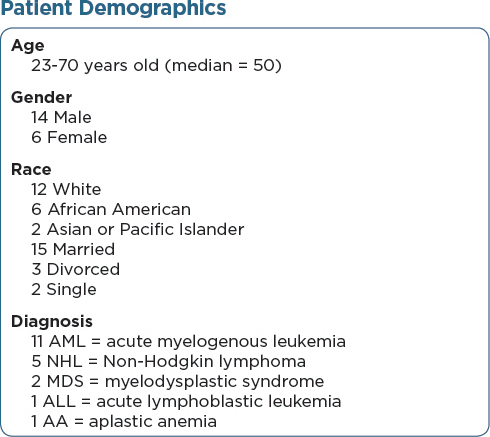Abstract
Purpose: To develop and evaluate the use of a comprehensive educational checklist for allogeneic stem cell transplant patients, that will be used by all members of the HSCT interdisciplinary team (IDT) during initial transplant hospitalization. Significance: Allogeneic hematopoietic stem cell transplantation (HSCT) has emerged as a unique treatment modality. 50% of patients who received an allogeneic HSCT and caregivers report feeling inadequately equipped to manage post-discharge plan of care. HSCT patients remain one of the most fragile populations to prepare for discharge and present a challenge to be information ready. It is essential that interdisciplinary team (IDT) members prepare the HSCT patients with the education needed in order to deal with the overwhelming task involved during and after hospitalization. Healthcare checklists have produced dramatic, sustained gains in patient safety and quality of care. Checklists provide an ideal way to comply with standards of evidence based care and promote good communication among IDT members. Sample/Methods: IDT members of the adult HSCT program and a convenience sample of adult HSCT patients undergoing their first allogeneic stem cell transplant. The project was conducted by educating IDT members on how to use the checklist, encouraging use of the checklist as documentation of education while patients were hospitalized. Then evaluating the completed checklists items at discharge. A pilot study. Results: IDT educated (n=82), 22 patients consented, 20 participated (2 patients did not receive transplant). Average completion of checklist was 76%. Self-care domain (95%) was most documented domain, while adapting to post-transplant lifestyle (62%) was the least. IDT members with a nursing educational background accounted for 95% of all documentation completed. Conclusions: Checklists were completed by various IDT members throughout hospitalization of HSCT patients. IDT members often assume that “other” team members are completing education; however, if there is a lack of documentation there is no reliable source to verify completion of the education. Documentation was viewed as a “burden” by IDT members leading to documentation “fatigue/burnout”. Implications for Practice: IDT checklists can only be as “interdisciplinary” as those who participate and document. Inherit care complexity of patients with multiple “teams”, can be streamlined with a checklist. This checklist allows for the IDT members to engage in meaningful discussions with patients and caregivers about their plan of care. From this discussion, that goes beyond the standardized education of HSCT patients, allows IDT members to develop a plan to effectively manage their care following discharge.








